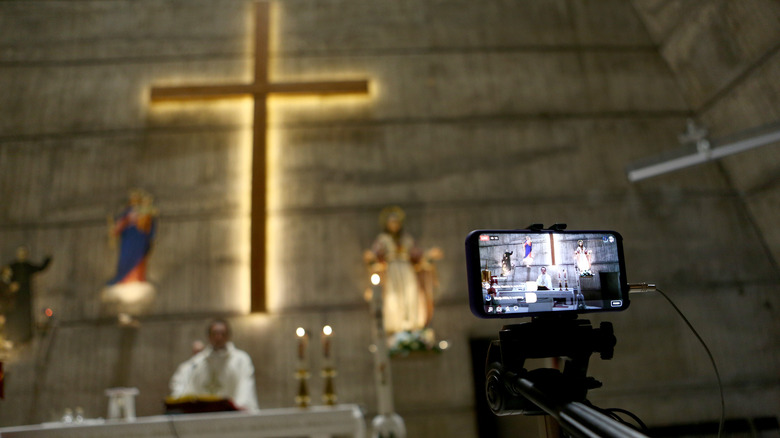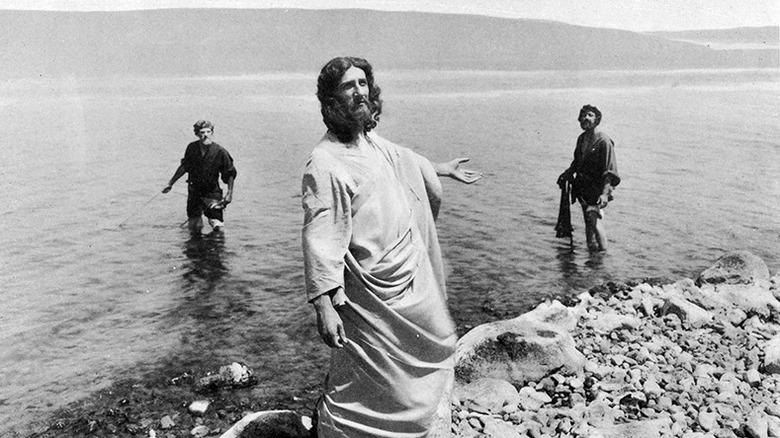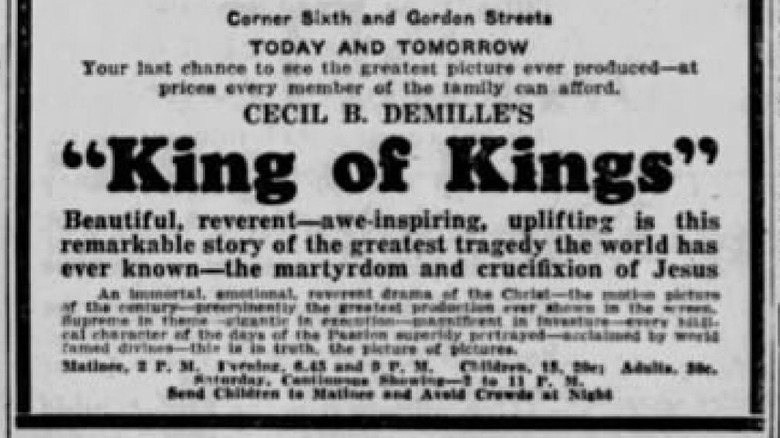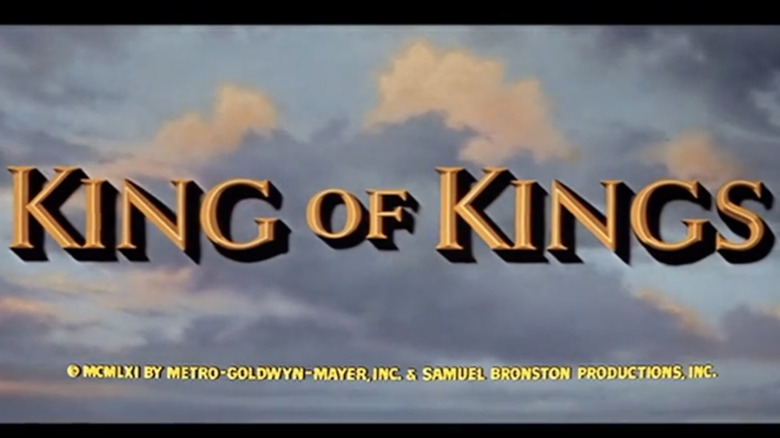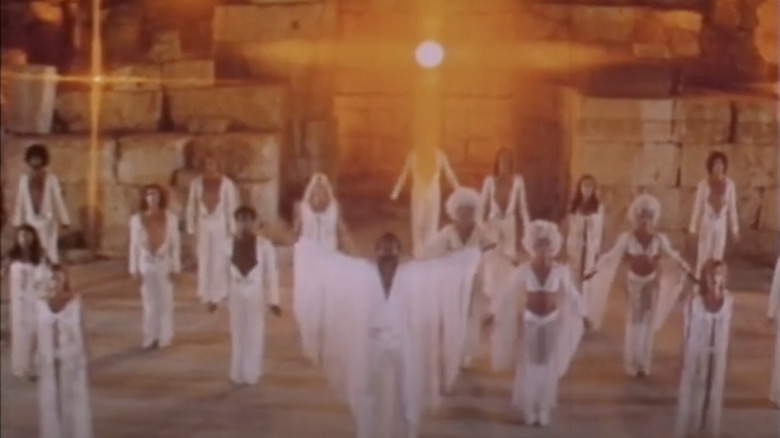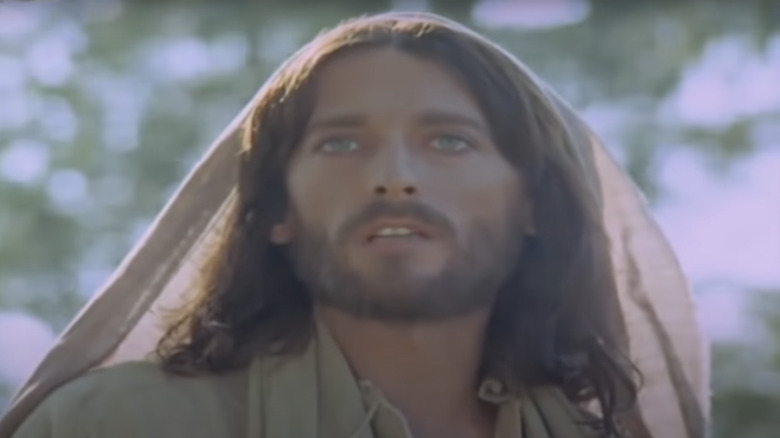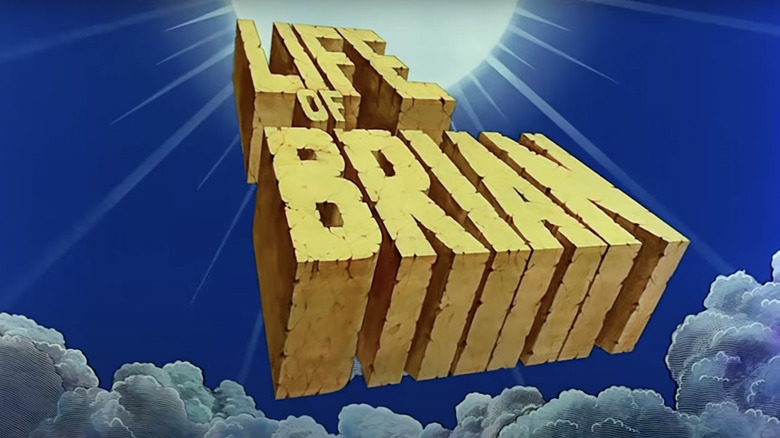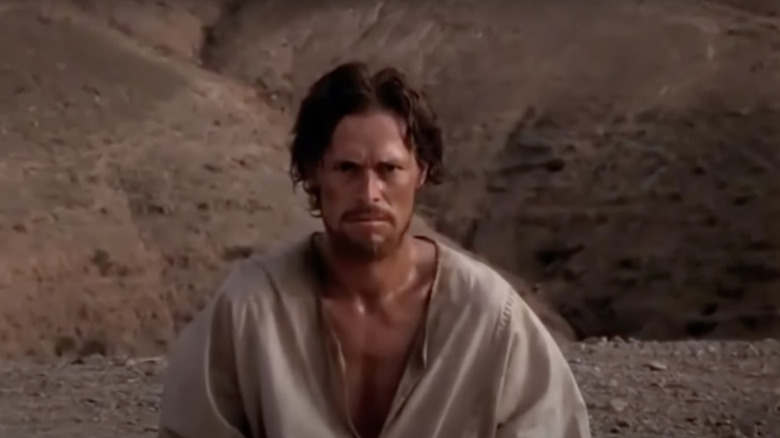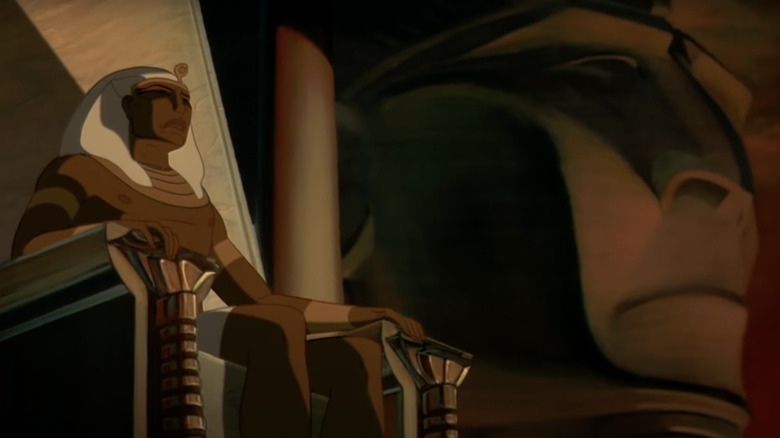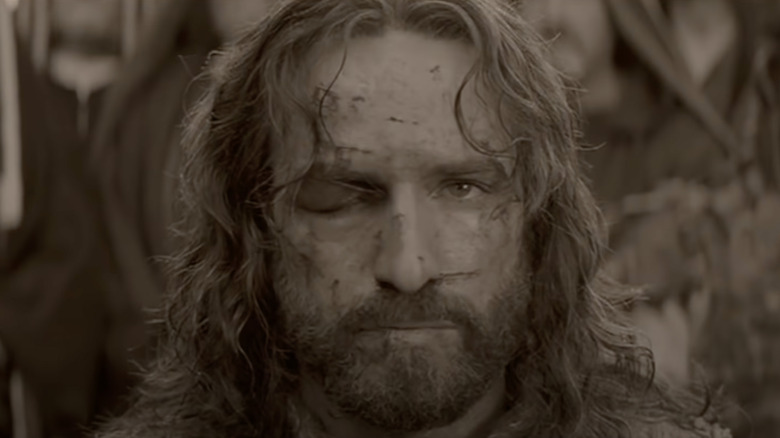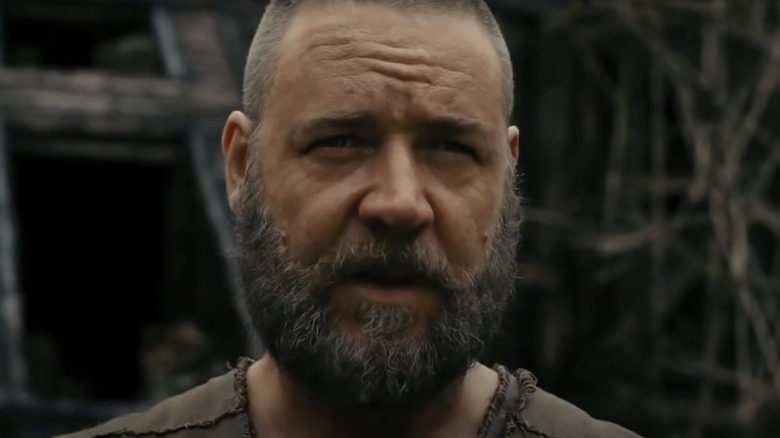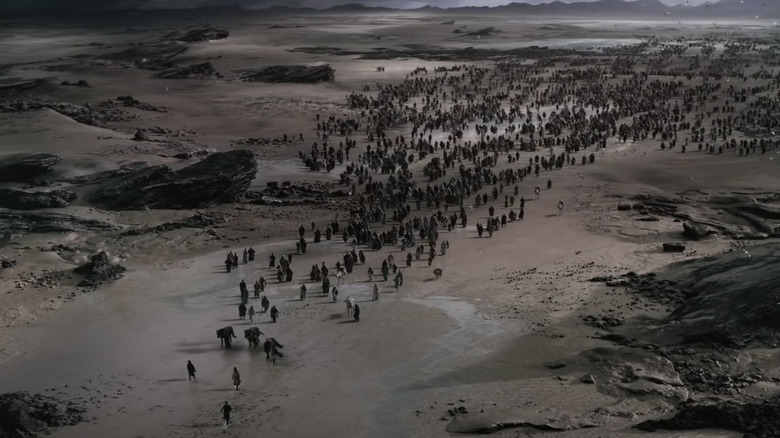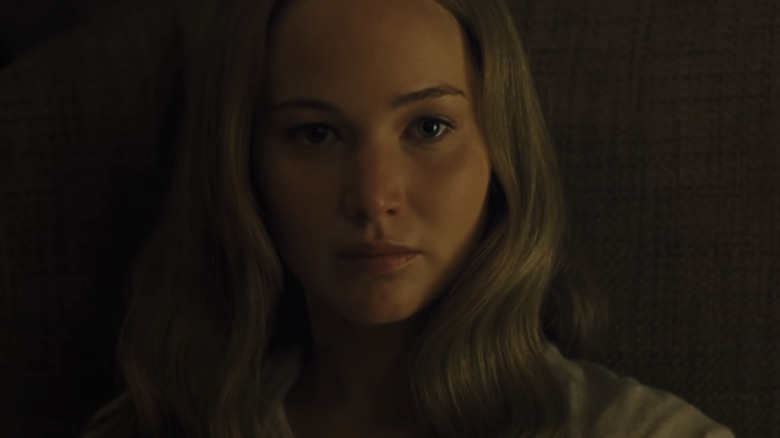The Most Controversial Movies Based On The Bible Explained
Hollywood and the global Christian church have a long history of suspicion towards one another. Vice explains the relationship, saying "For most of the 20th century, evangelicals and Hollywood remained in their separate cultural and economic corners. ... many radical Christians believed ... that intellectual elites had it in for them and retreated from the spotlight." Early massive-scale biblical epics such as "The Ten Commandments" and "Ben-Hur" were "driven by profits, not proselytizing," according to Vice, and Christian-inflected films made by Hollywood eventually led to evangelical Christians creating their own production companies.
However, more recently, the Bible genre has become profitable in Hollywood. Once "The Passion of the Christ" became a box office success, every studio scrambled to create a Christian subset for its company (via Vice). "Noah" and "Exodus: Gods and Kings" were mainstream movies with big names both behind and in front of the camera. Marcus Pittman, a Christian documentary filmmaker, explains that these movies signalled a new era of faith-based films, telling the Guardian that "There used to be this attitude of well, they've made this terrible movie, but it's all in the name of Jesus so we should go. ...But this idea that Christian movies as a genre -– this kind of Joel Olsteen, chicken-soup-for-the-soul version of Christianity ... it's kind of insulting. Bad movies are kind of blasphemy to the image of God."
However, bland sentimental plots are far from the worst examples of blasphemy that some religious groups and individuals have found in movies. Angering Christians, Jewish organizations, and the people of Egypt among others, here are some of the most controversial movies based on the Bible.
From The Manger to the Cross (1912)
The silent film "From the Manger to the Cross" was released in 1912. According to "The Miracle of the Movies," the film was directed by a young, Canadian director by the name of Sidney Olcott, who had previously made a short version of "Ben-Hur" and made films in Ireland about the Irish rebels of 1790. Both of these ventures ended up in copyright trouble of some sort, and Olcott found himself attempting to find a story that wouldn't run into copyright issues. Spoiler: it was the Bible.
The film was shot in Jerusalem and on the banks of the Sea of Galilee, but even a straightforward re-recreation of the life of Jesus made at the actual locations of the biblical events was not safe from outrage. According to "The Miracle of the Movies," the Daily Mail wrote "Is nothing sacred to the film maker?" The newspaper also made the claim that the film had only been made to make American producers rich. "From the Manger to the Cross" reportedly ran quite successfully at Queen's Hall in London for eight months, perhaps in part due to the negative publicity that it received.
The King of Kings (1927)
Before Cecille B. DeMille became one of the most recognizable names in Hollywood history with his biblical epics, he made 52 silent films between 1914 and 1928. "The King of Kings" was his second to last silent film and his second major biblical film (preceded by "The Ten Commandments" according to Silent Films, 1877-1996: A Critical Guide to 646 Movies). "The King of Kings" film depicts the final days of Jesus' life before his crucifixion. Caiaphus, the high priest of Israel, who is played by Rudolph Schildkraut, seeks to work with Roman officials to have Jesus crucified.
The November 21, 1927 edition of the Jewish Daily Bulletin, shows some of the outrage that surrounded the release of "The King of Kings." DeMille came under fire from Jewish critics for his portrayal of Caiaphus, a Jew, as the central villain of the picture (via the Jewish Daily Bulletin). This understanding of the crucifixion has been a mainstay criticism towards Christian doctrine since the early church, when the gospels themselves could be read as placing the fault of Jesus' death on the Jewish people (via Britannica). However valid the Jewish response to DeMille's film might have been, DeMille did not help himself with his response to the criticism. "The very men who read prejudice into the picture are themselves storing up material for anti-Semitic propaganda. ... The 'King of Kings' does not in any manner encourage such prejudice," he said in a statement that the Jewish Daily Bulletin described as using "arrogant language."
King of Kings (1961)
In 1961, the director of "Rebel Without a Cause," Nicholas Ray released "King of Kings," a biblical epic showcasing, once again, the entire life of Jesus from birth to death to resurrection. Ray had tremendous pull and earned significant praise from well known film critics and philosophers, including Jean Luc Goddard who noted, "cinema is Nicholas Ray" (via Indie Wire). The fact that a director of such note would take on the story of Jesus seemed to ensure film canon acceptance.
However, the October 19, 1961 issue of the Catholic Advocate discusses the theological and marketing issues of "King of Kings," from the studio claiming it received a rating from the Vatican which, according to the author, did not exist, to the many scriptural inconsistencies of the film. The article quotes film critic Moira Walsh describing the movie as a "gigantic fraud" that had "crucial falsifications," and saying that "while Christ is there in His physical presence ... His spirit is absent." She also offered a sentiment that some Christians held towards Hollywood in general: "as long as film companies persist in these tactics the chance of a fruitful dialogue between the churches and the film industry in this country seems fairly remote."
Jesus Christ Superstar (1973)
Before "Jesus Christ Superstar" was a film, it was a Broadway show. The theater production started in 1973 and continues to be one of the most oft-staged productions to this day (via Providence Journal). Yet, even as a broadway production, it received criticism from various religious groups. When the original concept album came out in 1970 — before it was even a play — it "fizzled in England and was even banned briefly by the BBC for being sacrilegious" (via Providence Journal). Some religious observers found the play to be quite good, according to the article, while others took issue with the plot being seen through the eyes of Judas and Jesus being depicted as mortal and having intimate feelings for Mary Magdalene.
Yet the Andrew Lloyd Webber musical remained popular enough for a film version to be made, and it was also subject to criticism. The New York Times reports that Benjamin R. Epstein of the Anti-Defamation League of B'nai B'rith noted that an "emphasis on a Jewish mob's demand to kill Jesus can feed into the kind of disparagement of Jews and Judaism which has always nurtured anti-Jewish prejudice and bigotry" — much like the claims made agains "The King of Kings." Epstein also offered this interesting bit of cinematic interpretation: "Anyone who has ever seen cowboy films knows that the good guys wear white hats and the bad guys wear black. Here the actor portraying Jesus is blond; Judas is black; the priests and rabbis are dark-haired, foreboding, and garbed in black." According to the same article, Universal Pictures responded to these critiques by saying the film was "a rock opera, a musical entertainment, not a religious tract."
Jesus of Nazareth (1977)
When we talk about the television/film epic, "Jesus of Nazareth," we must first talk about its controversial director, Franco Zeffirelli, who was a "deeply conservative Roman Catholic, according to NPR. He was opposed to abortion and gay rights, and was also a member of a right wing political party in the Italian Senate. Yet even a conservative Catholic is not safe from criticism around his portrayal of Jesus.
Zeffirelli and producers consulted with "experts from the Vatican to the Leo Baeck Rabbinical College of London and the Koranic School at Meknes, Morocco" in order to make the six-hour spectacle "Jesus of Nazareth" as accurate as possible, yet even this was not good enough for American fundamentalist Protestants led by Bob Jones III, known for the private evangelical college Bob Jones University (via Time). Jones' criticism followed Zeffirelli's comment that he would portray Jesus as a gentle, simple man. Without even seeing the movie, Jones declared it "blasphemy." Following his statement, 18,000 angry letters were received by General Motors, which helped to fund the film. As reported by Time, the auto company backed out of sponsorship.
Monty Python's The Life of Brian (1979)
British comedy group Monty Python are known for the sketch show "The Flying Circus" and various films, including their most controversial, "The Life of Brian." Although it's considered a classic today, when it was released in 1979, "The Life of Brian" was criticized by a number religious organizations. According to the Guardian, the Catholic archdiocese of New York and three Jewish organizations — the Rabbinical Alliance of America, the Union of Orthodox Rabbis, and the Council of Syria and Near Eastern Sephardic Communities — condemned the film. The archdiocese described it as a "crime against religion which holds the person of Christ up to comic ridicule," and Jewish leaders claimed it was "a vicious attack on Judaism and the Bible."
According to the BBC, the biblical comedy had been due to open on 200 screens across the U.S., but after the response from religious groups and subsequent publicity, "the number of screens was tripled." Michael Palin, one of the members of Monty Python, stated that the group originally planned to make the film about Jesus, but they did research on him and found him to be "a very straight, direct man making good sense, so we decided it would be a very shallow film if it was just about [him]" (via the BBC). Instead, they made a film about a 13th disciple who was always late and would miss all of the spectacles of Jesus.
The Last Temptation of Christ (1988)
Martin Scorsese is one of the most celebrated American directors, with classics such as "Raging Bull," "Taxi Driver," and "Goodfellas" on his filmography. Roger Ebert.com reports that Scorsese is a lapsed Catholic, but that while he "may not actively practice his faith, and he may not line up with all the beliefs of the Roman Catholic Church ... his Catholicism will never really leave him — Christ will always haunt him."
Perhaps it's no surprise that this version of faith opened him up to criticism. Scorsese's most controversial film, "The Last Temptation of Christ" bore the brunt of the Christian right, who called it blasphemous for its attempt to show the human side of Jesus and inclusion of a scene in which he imagines having sex with Mary Magdalene. The protests were so strong that the United Artists theater chain would initially not screen it. Scorsese also received death threats and "the jeremiads of TV evangelists" (via "Scorsese by Ebert"). The outrage got so bad that a theater in Paris was set ablaze in response to it showing Scorsese's film. According to the New York Times, the fire left 13 people hospitalized.
The Prince of Egypt (1998)
The 1998 animated film "The Prince of Egypt" is considered one of DreamWorks' success stories. It has an 80% score on Rotten Tomatoes (and a 90% audience score). A Cinemablend critic reports "after watching it, I feel more connected to my faith than I have in a long time." However, the love is not universal, with some seeing the film as revisionist history.
According to the Guardian, some Egyptian critics and columnists called the feature film an attack on Arabs and Muslims by a "Jewish-dominated Hollywood." Despite the filmmakers checking with Egyptologists and religious scholars, some see the movie as inaccurate, which the newspaper connects to "a hatred of Israel that lingers despite the peace treaty signed by Cairo with the neighbouring Jewish state in 1979."
One commenter took issue with the title of the film giving the impression that Moses ruled Egypt. Mr Hammouda (via the Guardian) said, "In the film we see that Moses was the architect of Egyptian civilisation, which the film says the Jews founded and that when they left Egypt, the heavens punished the Egyptians and destroyed their civilisation."
The Passion of the Christ (2004)
Mel Gibson is no stranger to controversy. The New York Times reports that his father was a Catholic extremist who rejected John Paul II's legitimacy as Pope, calling him a "Koran kisser," and who argued that the number of deaths that occurred during the Holocaust was inflated, if not fiction. Perhaps the apple didn't fall far from the tree. When Gibson was arrested for drunk driving, he yelled anti-semitic slurs including "The Jews are responsible for all the wars in the world!" (via LA Times).
Gibson co-wrote and directed "The Passion of the Christ," which was widely condemned for its perceived anti-semitism — the Anti-Defamation League described it as an "unambiguous portrayal of Jews as being responsible for the death of Jesus" – but another central issue was the movie's level of gore. Roger Ebert called it the most violent film he had ever seen, and the actors involved genuinely suffered for their art. Jim Caviezel, who played Jesus in the film, endured pneumonia and hyperthermia while filming, and "a couple of errant lashes during the extended flogging scene gave the actor a 14-inch scar on his back" (via the Independent).
Noah (2014)
After the success of his prior film, "Black Swan," director Darren Aronofsky decided to take on a biblical epic about the story of Noah and the flood. In an interview with The Hollywood Reporter, Aronofsky stated his intent in making the film was twofold: for secular audiences, "this fantastical world a la Middle-earth that they wouldn't expect from their grandmother's Bible school" while still making the film for those "who take this very, very seriously as gospel."
Aronofsky reported that unlike some of his other filming experiences, production company Paramount Pictures subjected the film to various trial screenings with Christian audiences to get an idea of how it would test with the faith-based crowd. He stated that many of the audiences had severe criticisms of the film: "Not necessarily 50 percent of the people, but maybe 10 or 20 percent. And those people can be very noisy" (via The Hollywood Reporter). The Washington Times explained another critique, "Mr. Aronofsky's description of Noah as the 'first environmentalist' also didn't sit well with Jerry Johnson, president of the National Religious Broadcasters, who called the film's 'insertion of the extremist environmental agenda a major concern'."
Exodus: Gods & Kings (2014)
By the time Ridley Scott started making "Exodus: Gods and Kings," he was a director who could get away with making pretty much any film he wanted to make, because he had made so many profitable movies in the past. However, no amount of clout can keep someone away from criticism, especially when it comes to adapting holy texts to the screen. It didn't help that the film's star, Christian Bale, stated in a press conference that Moses "was likely schizophrenic and was one of the most barbaric individuals that I ever read about in my life" (via Motion Picture Association).
The film was panned on its release, as can be notated by the 30% rating on Rotten Tomatoes. The Egyptian Culture Minister, Gaber Asfour, said that the film was "rife with mistakes, including an apparent claim that 'Moses and the Jews built the pyramids'" (via The Guardian). Like "The Prince of Egypt," the film ran into criticism for its understandings of history. This would not be the only criticism. Scott's film was accused of whitewashing a Middle Eastern story by having Bale and Joel Edgerton play its two leads. Scott did not help in the wake of the criticism by his response: "I can't mount a film of this budget, where I have to rely on tax rebates in Spain, and say that my lead actor is Mohammad so-and-so from such-and-such" (via Variety).
mother! (2017)
Perhaps the only film on the list that is a loose adaptation of the whole Biblical narrative with Pagan beliefs and other religious myths and doctrines strewn throughout, "mother!" made quite a stir on its arrival (via Reel World Theology). This is probably not surprising for anyone who has kept up with the career of director Darren Aronofsky. It remains "only the 12th title in history to earn an "F" CinemaScore from audiences" which did not give Paramount Pictures high hopes for its bottom line (via Indie Wire). Yet, unlike with "Noah," it appears that Paramount backed Aronofsky completely, stating: "This movie is very audacious and brave. ... We don't want all movies to be safe. And it's okay if some people don't like it" (via Indie Wire).
A scene involving an infant caused a significant outcry, including National Review, which described it as "Deliberately grotesque and nauseating, and seemingly engineered to outrage Christians, especially Catholics." One wonders if this type of response only invigorates the creative output of a director like Aronofsky. Only time can tell.
